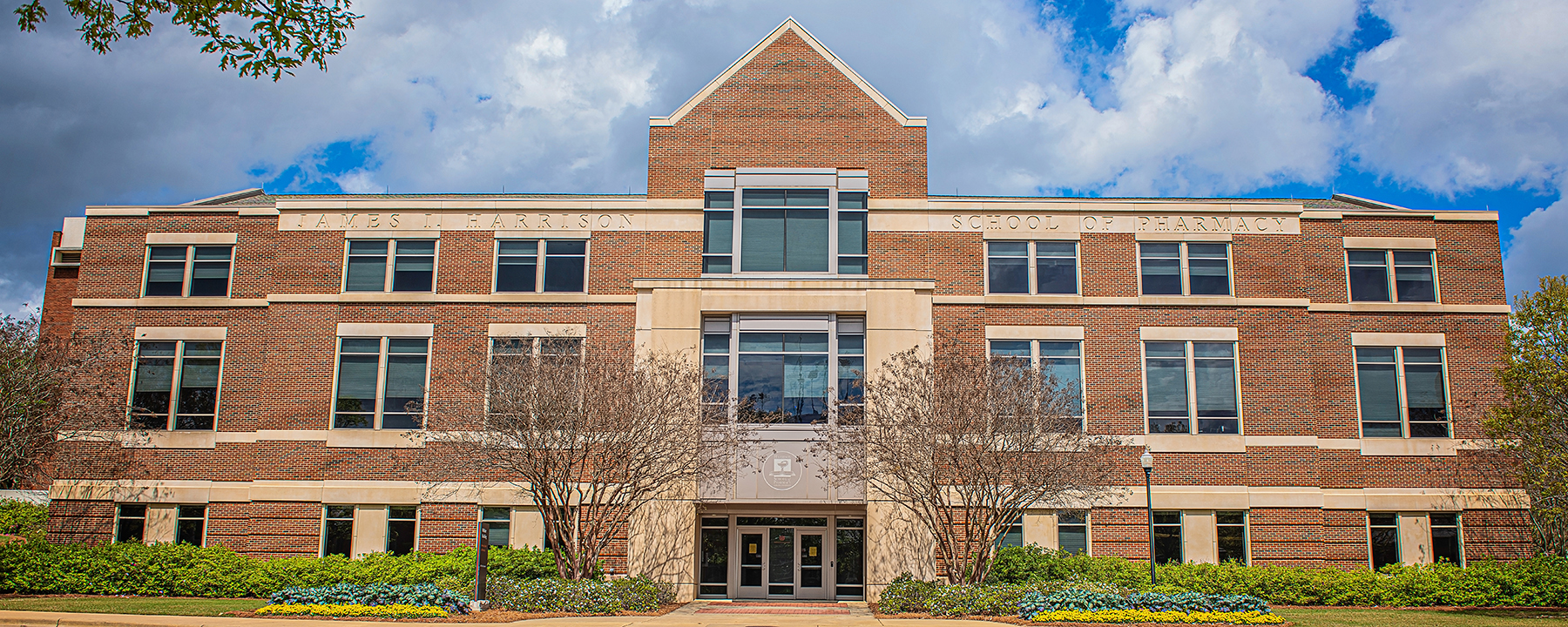
Auburn University, chartered in 1856, is located in Auburn, Alabama. For more than 150 years, Auburn has evolved into a premier comprehensive university. The University has a unique role among the State’s higher education institutions in that its mission involves three interrelated components: instruction, research, and extension. Undergraduate, graduate and professional students receive outstanding instruction at Auburn University. The University is recognized for providing quality instruction that is economically accessible for students. Many areas of research conducted by Auburn University are providing the citizens of Alabama with a better quality of life.
Founded in 1885, Auburn University's pharmacy program ranks among the top 20 percent in the country, according to U.S. News & World Report. In November of 2000, the Pharmacy Building was named in honor of W.W. Walker, founder of Birmingham-based Walker Drug Company. On Jan. 25, 2002, the Auburn University College of Pharmacy was named the James I. Harrison College of Pharmacy, honoring the contributions Harrison and his family made to the field of pharmacy in the state of Alabama.
The Harrison College of Pharmacy offers the Doctor of Pharmacy degree, as well as graduate degrees in Pharmaceutical Sciences. The College has campuses both in Auburn and in Mobile, Alabama. The Mobile campus, created in 2006, is housed within the University of South Alabama Research Park and is a collaborative venture with USA.
The college is made up of three academic departments (Drug Discovery and Development, Health Outcomes Research and Policy, and Pharmacy Practice) and three administrative divisions (Academic Programs, Clinical Affairs and Outreach, and Faculty Affairs and Strategic Initiatives).
The Auburn Doctor of Pharmacy (Pharm.D.) degree program is a four-year course of study that requires the completion of the pre-pharmacy curriculum prior to enrollment. The curriculum is designed to facilitate the development of those abilities necessary for entry-level practitioners in various practice settings. Consistent with accreditation standards and guidelines, the curriculum provides an appropriate balance of course work in the following areas: biomedical sciences (basic and clinical); pharmaceutical sciences; behavioral, social, and administrative pharmacy sciences; pharmacy practice; and pharmacy practice experience. The goal of the curriculum is to prepare students who can provide pharmaceutical care and are life-long learners. To accomplish this, the curriculum involves students in continuous patient care responsibilities starting upon entry into the College. Students also participate as active, self-directed learners in interdisciplinary teaching models.
Auburn University Harrison College of Pharmacy’s Doctor of Pharmacy program is accredited by the Accreditation Council for Pharmacy Education, 190 South LaSalle Street, Suite 2850, Chicago, IL 60603, 312/664-3575; FAX 866/228-2631, web site www.acpe-accredit.org.
The Auburn University Harrison College of Pharmacy offers interdisciplinary M.S. and Ph.D degree programs in Pharmaceutical Sciences. Those pursuing one of these degrees must select one of four curricular options: 1) Medicinal Chemistry, 2) Pharmaceutics, 3) Pharmacology, or 4) Health Outcomes Research and Policy.Dual-degree programs are also offered for those interested in Pharm.D.-Ph.D. and Pharm.D.-MPH.
The Medicinal Chemistry, Pharmaceutics and Pharmacology options are designed for students interested in the drug discovery or development processes, and are affiliated with the Department of Drug Discovery and Development. Areas of interest include neurodegenerative diseases, cardiovascular diseases, infectious diseases, cancer, diabetes and other metabolic diseases, synthetic organic chemistry, forensic analytical chemistry and drug delivery, disposition and formulation.
The Health Outcomes Research and Policy option is designed for students interested in analyses of pharmaceutical care outcomes and the management and optimization of pharmaceutical care organizations, and is affiliated with the Department of Health Outcomes Research and Policy.
The M.S. degree is offered under the thesis option. Students must earn a minimum of 30 semester hours of graduate courses, 6000 level or above. Thesis students register for Research and Thesis in semester(s) when working on the thesis, when submitting, defending or awaiting final approval of the thesis, and when taking final examinations. Candidates for the M.S. degree are required to prepare a thesis proposal and complete a proposal defense.
Auburn’s Harrison College of Pharmacy is ranked among the top 25% of all pharmacy schools by U.S. News & World Report.
HCOP is fully accredited by the Accreditation Council for Pharmacy Education (ACPE).
Auburn’s pharmacy program was founded in 1885. The college was named the James I. Harrison College of Pharmacy (HCOP) in 2000. The Mobile campus was added in 2007.
Students from 23 states and 14 foreign countries
HCOP offers students the opportunity to get involved in more than 20 student organizations
Class Snapshot (Class of 2023):
Over the past year, HCOP researchers have generated more than $5.97 million in research funding.
HCOP Clinical & Research Faculty totaled totaled more than 160 authorships last year along with 75 authorships from graduate students.
4 PGY1 ambulatory care resident positions
HCOP is committed to improving the health outcomes of Alabama citizens by optimizing the use of medications and promoting wellness. HCOP operates three pharmaceutical care clinics and three pharmacies on the Auburn campus and downtown Montgomery:
HCOP offers four Continuing Education programs annually, involving more than 500 participants. For more information, go to pharmacy.auburn.edu/ce.
On April 22, 2014, the Harrison College of Pharmacy introduced a new slogan: "Making Medications Work Through Innovative Research, Education and Patient Care."
The idea of a slogan was first brought up in 2012, with a call put out to students and faculty to submit ideas. While the intention was to review the submissions and select a winner, the end product ended up being a conglomeration of the submissions.
The slogan hits on three main areas as part of the mission of Auburn University and the Harrison College of Pharmacy: Research, Teaching and Outreach.


